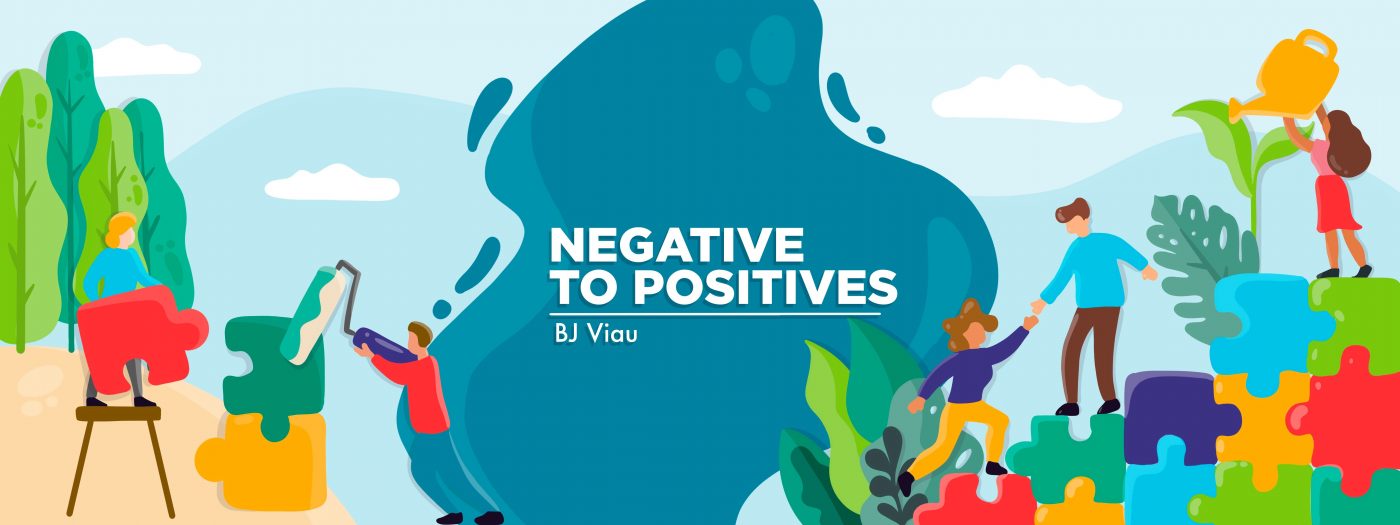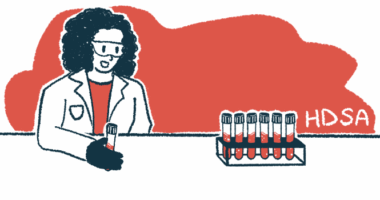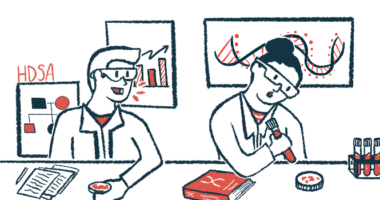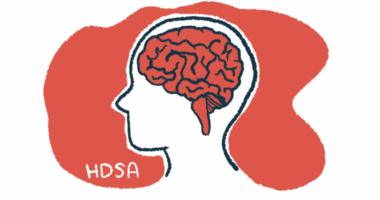Seeking new strategies in the war against Huntington’s disease
Why it's vital that we accelerate HD research and treatment development

I joined the war against Huntington’s disease (HD) back in 1995, after my mom, Debbie, underwent genetic testing that confirmed she was gene-positive for HD. Her father also carried the genetic mutation, but he passed away in 1990, when I was only 3 years old. I was just a kid, so until my mom was diagnosed, I didn’t understand that the disease could potentially affect her, my sister, and me.
I’ve shared in my columns and public talks that my parents decided to tackle Huntington’s head-on. The first step was telling my sister and me about Mom’s genetic test results and what they meant for our family. The second was getting us involved in the war against HD.
Not long after my mom’s diagnosis, my dad, Bryan, flew to New York City to visit the national office of the Huntington’s Disease Society of America (HDSA). He went to Barbara Boyle, then the nonprofit’s CEO, and demanded the organization find answers. According to my dad, Boyle responded, “We need your help, so what are you going to do, Bryan?”
That interaction inspired him to take on a new leadership and advocacy role in our family. When I was 9 and asked to hold a basketball fundraising event, he didn’t waver, even though it was a major commitment. Starting in 1996, for 15 years, we hosted an annual community Hoopathon to raise money for HDSA. We thought we were making a difference in the battle against HD.
Over the years, we improved our weaponry and strategy, and our army grew from tens to hundreds, but the enemy kept moving the line on us. My mom continued to decline, progressively losing all of her abilities until she passed away in 2011. HD friends we’ve met on the battlefield have also lost their abilities and their lives.
After my mom’s death, all the time and energy we put into saving her felt meaningless. “Frustrating” doesn’t even come close to describing it. But even though my sister and I were both fortunate to test negative for HD, we keep fighting in honor of our mom and the many people who test positive.
Changing tactics
Over time, though, I’ve started wondering if we’re fighting the battle with the wrong weapons. Although the Hoopathon raised thousands of dollars each year, a 2020 JAMA article notes that the average cost of bringing a new drug to market is estimated to be about $985.3 million. We were throwing pebbles at a monster that was bigger and stronger than we ever imagined.
I don’t regret holding the Hoopathon events, as those days put the biggest smile on my mom’s face. But I wish I realized earlier in my fundraising days that if we really want to make a difference for those with HD, I needed to find some bigger weapons.
I share this realization because I see so many intelligent and talented people in the HD community who are spending their time throwing pebbles when they could be making a bigger impact. My hypothesis is that many of these people don’t even know where to find bigger weapons or who to aim them at, but I’m here to help.
To take down the HD enemy, we need more people to advocate for policy changes, more guidance from the U.S. Food and Drug Administration, and more investment from pharmaceutical companies.
We need innovators.
Too many casualties
It’s been over 12 years since my mom passed away, and I don’t feel like we’re significantly closer to advancements in treatment or policy changes that will save lives. If we continue on the same course and at the same pace, we’ll continue losing so many people to HD.
I’ve tried to do some basic math to come up with a statistic I’ve never seen anyone share. According to HDSA, about 41,000 people in the U.S. are now experiencing Huntington’s symptoms. The average life expectancy for HD patients is 15-20 years after the onset of clinical symptoms. If we divide 41,000 people by 15-20 years, it’s possible that between 2,050 and 2,733 people die from HD each year in the U.S. — which would equate to 5.6 to 7.5 deaths each day.
I can’t keep being a community advocate without acknowledging that people are dying on the battlefield every single day. It’s time to change that. It’s time to gather a new group of soldiers who can think of strategic new ways to accelerate treatment development and, eventually, find a cure. Together, we can save lives.
Reach out to me or leave a comment below if you want to discuss new ways we can battle HD together.
Note: Huntington’s Disease News is strictly a news and information website about the disease. It does not provide medical advice, diagnosis, or treatment. This content is not intended to be a substitute for professional medical advice, diagnosis, or treatment. Always seek the advice of your physician or other qualified health provider with any questions you may have regarding a medical condition. Never disregard professional medical advice or delay in seeking it because of something you have read on this website. The opinions expressed in this column are not those of Huntington’s Disease News or its parent company, Bionews, and are intended to spark discussion about issues pertaining to Huntington’s disease.








Karen Johnson
Hi BJ,
Thank you for this article, my daughter has HD and I’m very interested in doing whatever I can to help with finding a cure. Please reach out if I can help.
Karen
B.J. Viau
Thanks for the comment, Karen. Sorry to hear about your daughter. If I am being honest, I don't have the magic button to tell you to press, but please stay in-touch and I'll work to utilize this column as a way to share opportunities to step up when we get there. Appreciate your willingness to help!
Sima Walker
B.J. Viau, thank you for sharing. I feel exactly the same way. I am not sure how I can help, but I am willing to do what it takes. I am 76 years old and my husband suffers from HD. Our beautiful young daughter is at risk and does not wish to be tested. Needless to say, I am devastated, as I will not be here to care for her, should she test positive. I have learned all I can so far about this disease and attended every webinar possible, despite my taking care of my husband. Please let me know what I could possibly do to help.
B.J. Viau
Hi Sima - thanks for writing and sorry to hear about HD in your family. Sometimes the best thing to do is stay educated and engaged. I would challenge you (and others) to dig deeper and ask questions on those webinars challenging the advocacy organizations and scientists and professionals to think differently and try new tactics and strategies. It isn't simple, but we need people to keep pushing those working in HD!
Vic Aul
Hi B.J. Viau,
Thank you for I’m sorry to hear about your struggles with HD as well. My wife has Huntington’s, she’s a brilliant person who studied to be a surgeon. Who now helps others with HD.
We have attended clinics at UCSF, UC Davis. We read and study about MRA’s and try to participate in any trial we can. Like you, and many others, we’ve done fundraising benefit concert's, joined walks and HD committees, to generate money for grants and HD research. We feel no closer to cure than we started this journey five years ago.
I agree, we need bigger weapons. But where do we find them?
B.J. Viau
Hi Vic - thanks for your comment and your commitment to HD! Sorry to hear about your wife's impact with HD, but love that she's using her surgeon brain to help others!
I think "where do we find them?" is the question without an answer right now, but it's my belief if the leaders in the community remain "content" with what we have today then nothing will change. We need healthy public debate talking about key issues vs closed door conversations. We need to encourage innovation, whether that be non-pharmaceutical technologies, new policies, program services, clinical trial protocols, biomarker validation etc.
I've first hand felt that lack of appreciation for innovation as the founder of HD Genetics (new genetic testing service). Many "key" leaders in the HD community have not been supportive and as an entrepreneur whose invested A LOT of personal time & funds to bring this company to life, it's incredibly unmotivating to want to do more. Luckily the true HD community (people who are impacted) have been very supportive so we keep pushing, but breaking through political barriers of a debilitating rare disease is pathetic when we should be encouraging entrepreneurs to innovate!
Malte Thran
Dear BJ, thank you for the article. I do have a plan. Actually its not just "a" plan. I think, it´s THE MASTERPLAN. No kiddin. If you send me an email I can write down my plan, it will take a while, because my english is not that well, and then I am really interested in what you say about it. It actually is a plan that not only improves the research funding for Huntington, but for all rare diseases. The plan is totally megalomaniac, but I think, it would work. Bye Malte
B.J. Viau
Hi Malte - send me an email ([email protected]) and I look forward to reading about your ideas! Thanks for the note.
Jay Sullivan
Thank you for the efforts you and your family have made. We don't know that we need boulders until we at least throw some pebbles.
My mom is about to turn 75 and is in assisted living with HD. We already lost her sister and her father to it, with 2 other family members lost that were possibly misdiagnosed with Parkinsons.
I'm 45, gene-positive at 41 repeats, though with no children to be concerned about passing it to. My sister has chosen to not be tested.
Thank you for stating that we need to keep pushing. I focus on my mom's well-being and mental state the most, but I need to be working harder with Georgetown Neurology and others to move this along.
Austedo has been great, but it's a finger in the dyke when we need a new dam.
I appreciate your continued involvement in honor of your mother. I'm sure she'd be proud.
B.J. Viau
Thanks for reading and for the nice note, Jay! Sorry to hear about your family's impact with HD.
Georgetown Center is already a leader in the HD clinical community, but they still have more potential as one of the only centers with dedicated staff specific to HD. We need them to be thinking differently, push the paradigm and bring positive change. Please keep pushing them!
Anne Fowler
My daughter has HD. Her father died of HD in 2002. I would like to help but it would need to be something I could do from my home. I am 74 and have back and knee issues so I can't sit or walk very long.
B.J. Viau
Hi Anne - thanks for the note. I think new weapons in this war is going to be more brainpower than actual strength of getting up and fighting. Please stay tuned on opportunities to help soon!
Kevin Jess
The approach to treatments for HD needs to be more holistic. In other words, we need to stop categorizing it as a movement disorder. HD is much more than that. My wife passed in 2021 from complications due to HD. She never had movement of any sort. My daughter has it now and she does not have movement. Both experience psychological symptoms for the most part. The diagnostic criteria must change and it will. That will be the most significant event to happen for HD since the discovery of the gene. Future treatments will most likely depend on early diagnosis.
B.J. Viau
Hey Kevin - I totally agree. It's frustrating that it takes "moving a mountain" to change something that everyone sees right in front of our faces. Thanks for your continued advocacy!!
Shaun O'Neil
Reading up on sites like HD buzz and Huntington's disease news that we are moving in the right direction. I sometimes feel the more people there are out there the better in the fight against this awful disease, especially people like you. I'm up for anything when it comes to eradicating this monster.
Kind regards
Shaun
Sarahjane Dawe
This such a brilliant article and I am right there behind you Bj.
As a family, we too are described as ‘major fundraisers’ for our local HD research centre and yes we’ve raised over £60K but it is merely pebbles!
Every day I read so many articles of breakthroughs and great findings, I keep positive every day for my beautiful daughter who is falling everyday and choking often but we keep positive nonetheless. ….Then you look at posts or photos and realise wow that was 9 years ago and we’re no further forward than back then!!!
I do believe we are getting ever nearer to that cure or treatment but it needs to happen now, how long do we have to wait in suppressed agony, watching our beloved family decline?